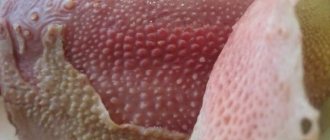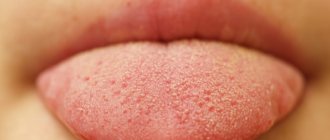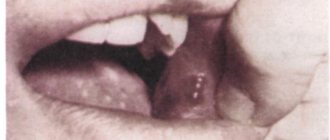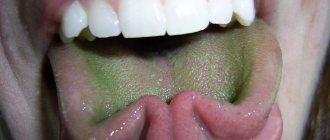Inflammation of the gastric mucosa caused by poor diet, negative effects of bacteria, and alcohol abuse is called gastritis. Types of gastritis are manifested by various symptoms, one of which is plaque on the tongue. This symptom may belong not only to gastritis, but also to other diseases of the gastrointestinal tract and other organs.
These can be liver pathologies, dehydration, side effects of medications, as well as intoxication and dyes from food products. In order to correctly diagnose the plaque that appears on the tongue during gastritis, you need to become familiar with the features of this symptom.
What does a healthy tongue look like?
The tongue is pale pink - absolutely healthy.
Diagnosis by the appearance of the tongue was mastered by ancient healers, who believed that a disease could not be considered cured until the patient’s tongue regained its previous appearance. The tongue of an absolutely healthy person has the following signs:
- Pale pink color;
- Small taste buds without pronounced features;
- No bad breath;
- Be moderately moist;
- The presence of a small amount of translucent bright pink coating is allowed;
- There is no unpleasant odor.
If you deviate from these signs, you should consult a general practitioner or gastroenterologist and undergo the examination prescribed by him.
Causes of glossalgia
As with other somatoform neurotic disorders, the etiology of language neurosis is closely related to the influence of stress factors. This is any situation that is psychologically traumatic for a person, for example:
- conflicts in the family, serious quarrel with relatives, betrayal of a spouse, divorce;
- demotion (or lack of long-awaited career advancement), job loss;
- personal or global financial crisis, especially against the backdrop of the need to make regular loan payments;
- suffered a serious illness and fear of re-illness (relapse);
- any disaster (experienced earthquake, flood, fire, transport accident, etc.).
Persons who tend to repeatedly exaggerate the scale of existing problems are predisposed to language neurosis. Usually they lack optimism, do not like fun, do not like to joke themselves, and avoid noisy companies for fear of appearing funny. They are very demanding of others and are afraid of losing control of the situation. Therefore, in families where one or both parents have signs of a neurotic syndrome, the unquestioning authority of the father or mother usually “reigns”, children suffer from overprotection.
Signs of deviations from the normal state of the tongue
It is quite possible that, once you look at your tongue, you will see a rather unsightly picture. Symptoms of deviation from the norm:
- A coating of various colors, thicknesses, and with different locations of spots appears on the back of the tongue;
- The sides of the tongue are bright red;
- The taste buds look uneven, some of them increase in size and begin to disturb with unpleasant sensations, taste sensations change, their intensity weakens;
- The oral cavity becomes unusually dry;
- In some cases, the appearance of pain and burning is diagnosed;
- There is an unpleasant odor from the mouth;
- After cleaning the tongue, the plaque appears again after a short time.
In the plaque that appears on the tongue, laboratory testing can reveal leukocytes, pathogenic microflora, and exfoliated epithelial cells.
This video will tell you about plaque on the tongue due to gastritis:
Diagnosis of diseases of the gastrointestinal tract by language
The tongue will tell you about gastrointestinal diseases.
Modern gastroenterology does not specialize in diagnosis based on the appearance of the tongue. However, an attentive person suffering from such pathologies can distinguish the symptoms of gastrointestinal diseases:
- Acute gastritis - a viscous, dense coating of white-gray color is visible on the entire surface of the tongue, with the exception of the tip and side parts. The mouth feels dry and has an unpleasant acidic taste. Perhaps, instead of dryness, increased salivation will appear. In acute gastritis, similar symptoms include heartburn and sour belching, cutting pain in the epigastric region 1-2 hours after eating, weakness, headaches, diarrhea, heaviness in the stomach. With inadequate treatment, acute gastritis becomes chronic.
- Chronic gastritis - light deposits on the tongue are replaced by occasional dark gray deposits. To the previous symptoms are added such characteristic signs of chronic gastritis as astheno-neurotic syndrome, constant irritation, aching pain that intensifies some time after eating. About 40% of all cases of acute gastritis become chronic. This condition is fraught with the spread of the process to the duodenum and the development of gastroduodenitis.
- A stomach ulcer in combination with gastritis affects the condition and appearance of the tongue - its surface becomes bright red, with gray spots of dense plaque that are difficult to clean. This picture is complemented by signs of stomatitis and cyanosis. The patient feels a burning sensation and the production of saliva increases.
- Oncological damage to the gastrointestinal tract, as well as the presence of internal circulation, is reflected in the condition of the tongue by the appearance of evenly spaced white plaque of increased viscosity, excessive saliva production, and a burning sensation in the oral cavity.
Preventive measures
Preventive measures against a “burning” tongue include the following:
- Proper dental and oral hygiene.
- Clean your tongue daily with a special cleaner (but not with a brush!).
- Compliance with drinking regime.
- Avoiding allergens, in particular food ones.
- Controlling blood sugar levels.
- Timely treatment of the gastrointestinal tract.
- Compliance with the principles of balanced nutrition.
- Regular preventive examinations with a dentist (at least 2 times a year).
Differentiation of plaque in gastritis from other diseases of the gastrointestinal tract
A thick, grayish coating is characteristic of dysentery.
It is important to suspect the onset of a dangerous disease in time. To take action and prevent complications from occurring. Differential diagnosis by tongue of gastritis from other diseases and conditions:
- A thick, grayish coating is characteristic of dysentery. In this case, the tongue looks cracked, and less saliva is produced than usual.
- Desquamative glossitis - this type of inflammation of the tongue is characterized by such symptoms as red spots of complete absence of epithelium or several altered taste buds on the tongue, covered with a white coating.
- Galvanic stomatitis is a form of inflammation of the tongue that arises as a result of a reaction to metal prostheses, manifested by spots in the form of pimples, and subsequently by the appearance of erosions against a background of white plaque.
- Infectious diseases - sore throat, scarlet fever, diphtheria, HIV infection can cause the appearance of a white coating on the tongue, but almost all of these infections are accompanied by high fever and skin rashes.
- Diseases of the heart and blood vessels - plaque is located on the anterior third of the tongue.
- Kidney disease - plaque on the tongue is localized at the back along the edges.
- Endocrine disorders - under the plaques of white plaque there are ulcers and erosions.
- Anemia is not a coating on the tongue, but blanching of the entire surface of the organ. Diseases of the respiratory system are often indicated by the localization of white plaque on the front and along the edges of the tongue.
- Diseases of the salivary glands - the appearance of a white coating is accompanied by the appearance of an unpleasant odor.
- Diseases of the liver and gall bladder - the color of the plaque is not white, but has a yellowish or brown tint. A white coating on the tongue can be caused by the consumption of dairy products, as well as the proliferation of bacteria and fungi in those who abuse sweets. Unlike plaque during gastritis, such layers are easily removed and do not form further.
When to see a doctor
If this is not the first time a burning sensation in the mouth has occurred, and the culprit is NOT spicy food, then this is a reason to consult a doctor. Based on the above reasons, doctors of various specialties can deal with this problem. First of all, these are therapists. A general practitioner, based on the history taken, will be able to exclude a number of pathologies and refer the patient to the right specialist. Among them are dentists, endocrinologists, infectious disease specialists, gastroenterologists and others.
Important! During the interview, the doctor should tell you about all concomitant diseases, lifestyle and medications you are taking. This information will help the doctor rule out a number of diseases and quickly identify the cause of the symptom.
Is plaque on the tongue dangerous - how to treat it
An ultrasound of the stomach will help clarify the diagnosis.
Plaque itself does not pose any threat to health. As soon as the underlying disease is cured, the condition of the tongue will return to normal.
As for gastritis, long-term treatment with careful adherence to the recommendations of a gastroenterologist will help relieve its symptoms.
Perhaps the doctor will conduct research aimed at clarifying the diagnosis: FGDS, ultrasound of the stomach, laboratory tests of blood and gastric juice. The following drugs will be prescribed as treatment:
- Antibiotics of 2-4 types, taken in combination:
- Pro- and prebiotics;
- Vitamins;
- Antacids;
- Proton pump blockers.
Patients with gastritis must follow a strict diet aimed at sparing the gastric mucosa and not provoking the release of excessive amounts of hydrochloric acid. With this treatment, not only the gastric mucosa, but also the condition of the tongue will definitely return to normal.
Treatment
Help before diagnosis
To reduce tingling and burning, doctors recommend following a diet. All hot and spicy dishes are excluded from the menu; food should be warm, but not hot. Products are prepared by steaming, boiling or stewing so that they are soft and do not injure the surface of the tongue. It is necessary to regularly rinse your mouth with water or a weak solution of chlorhexidine: this helps get rid of tingling and also prevent inflammatory diseases of the oral cavity.
Conservative therapy
Treatment for a tingling tongue begins with dental care. The doctor sanitizes the oral cavity and, if necessary, changes fillings and incorrectly selected dentures. If after this the symptoms do not disappear, treatment is prescribed for the underlying disease causing glossalgia. Therapeutic regimens are selected by a specialized specialist: neurologist, endocrinologist, gastroenterologist.
Pathogenetic treatment includes medications that affect the nervous system, which help reduce painful paresthesias. Herbal sedatives, bromine preparations, and “daytime” tranquilizers are effective. For refractory symptoms, injections of B vitamins and trimecaine blockades are used. Local remedies provide a quick effect: lubricating the tongue with anesthesin, pyromecaine, oil solutions (vitamin A, rose hips).
Those suffering from desquamative glossitis are often prescribed physiotherapy, which includes medicinal electrophoresis, ultrasound therapy, and SMT therapy. For prolonged glossalgia, reflexology and ozone therapy help relieve tingling. To reduce the intensity of symptoms, laser therapy is used, which has an additional anti-inflammatory effect. Paresthesia of a neurogenic nature requires psychotherapy sessions.









